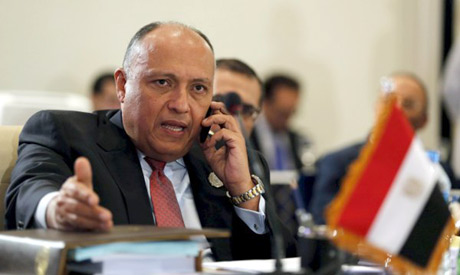Egyptian forces fought in North Yemen's eight-year civil war in the 1960s

Egypt's Foreign Minister Sameh Shoukri . Egypt said it is participating in a military campaign led by Saudi Arabia against Houthi rebels in Yemen.
Once again, Egypt is getting involved in a conflict in Yemen. On Thursday, Egypt announced it was providing military support – that could include boots on the ground – to Saudi Arabia and Gulf allies who launched air strikes against Houthi rebels in Yemen.
After battling central government in the northern province of Saada for a decade, the Houthi rebels took over Yemen's capital Sanaa in September.
This week, they pushed south to the coastal city of Aden, where Yemen's president Abd-Rabbu Mansour Hadi has been based since fleeing the Yemeni capital last month.
In the 1960s, Egypt became embroiled in a Yemeni civil war that lasted eight years and was considered as one of the low points of Gamal Abdel-Nasser's presidency, which ended with his death in the same year the war ended.
In that war however, Egypt was supporting the rebels. In 1962, soon after the establishment of the Republic of North Yemen by a military-led coalition under the command of Abdullah Al-Sallal, the first president of North Yemen, Egypt was quick to provide support to the fledgling republic against its royalist rivals.
The civil war between the new republic's regime and Muhammad Al-Badr, who was ousted after just a week as Imam in 1962, lasted until 1970, but Egypt pulled out from Yemen between 1968 and 1971, following Egypt's defeat by Israel in the 1967 Six-Day War.
In the 1960s civil war, Egypt had committed tens of thousands of its troops and millions of dollars worth of equipment and supplies to help its Yemeni allies, and while the North Yemeni Republic lasted, Egypt's commitment is now widely regarded as one of the main causes of the 1967 defeat, due to the strain it exerted on the Egyptian military and economy.
Proponents were however sympathetic with Egypt's efforts at spreading revolution throughout the region against its arch rivals at the time – then Arab kingdoms it saw as "backward regimes."
How times have changed
Unlike then, Egypt is now allied with Gulf kingdoms against the rebels. Saudi Arabia is leading the operation that was launched early on Thursday, along with Gulf Cooperation Council members Qatar, Kuwait, Bahrain and the United Arab Emirates.
Saudi Arabia has provided immense political support to Egypt since the latter's 2013 uprising which saw the Muslim Brotherhood ousted from power, and is a strong ally of Egypt's current president and former army chief Abdel-Fattah El-Sisi.
Saudi Arabia, the UAE and Kuwait have also provided Egypt with much needed financial support to prop up its battered economy. Gulf countries also pledged the largest bulk of investments at a recent Economic Development Conference Egypt held in Sharm El-Sheikh earlier this month. Combined, Gulf monarchies pledged over $50 billion to Egypt in aid and investments.
Also, in the 1960s, there was no sectarian angle to the conflict as many contend exists today. The conflict was between republican and royalist forces, and while Al-Badr and his predecessors were from the Zaidi sect of Shia Islam to which Houthis belong, his fight against the republicans was to regain his seat as Imam which his family had occupied since 1918.
The Houthi movement is new and has no direct connection to the 1960s civil war. Its roots date back to the late 1980s, but was recognised as a prominent political and armed force in the country at its first confrontation with the Yemeni government under the presidency of Ali Abdullah Saleh – also a Zaidi – in 2004.
The Houthis' main demands are less marginalisation and more recognition and institutionalisation of the Zaidi sect – to which a third of Yemenis belong – in the Yemeni state along with the official Sunni sect.
The fact that they are Zaidi and the belief that they are materially backed by Iran pushed the conflict to be viewed as a sectarian one and a proxy battle between Iran and Saudi Arabia.
Both Iran – then still a monarchy – and Saudi Arabia were backing the royalist side in the 1960s civil war.
Also contributing to the sectarian view is that one of the group's main grievances after Saleh was ousted in 2012 was that the following government led by Hadi wasn't doing enough – they said – to battle Al-Qaeda in the Arabian Peninsula (AQAP), which is one of the Houthis main opponents, as Al-Qaeda views Shia as apostates and sanctions killing them.
Others contend that the main conflict is essentially political and due to the group's grievances and long-sustained antagonism by Saleh, who ruled from 1978 to 2012, and thus not based on religious identity.
Saleh is now reportedly allied with the Houthis against Hadi and his allies, and has pulled strings to allow the Houthi takeover, in a move to undermine Hadi to whom he was opposed to after his ouster.
It is still not clear whether Egypt will take part in a ground invasion and how many troops it may dispatch if it does. Saudi Arabia is contributing 150,000 troops to the incursion into Yemen, Saudi satellite channel Al Arabiya has reported.
So far, Egypt has sent four naval vessels to Yemen, according to military sources, who said the country is on stand-by for a final decision of military deployment.
An Arab League summit will be held in the Egyptian city of Sharm El-Sheikh on Saturday, which most Arab presidents and monarchs are to attend.

No comments:
Post a Comment
Note: Only a member of this blog may post a comment.